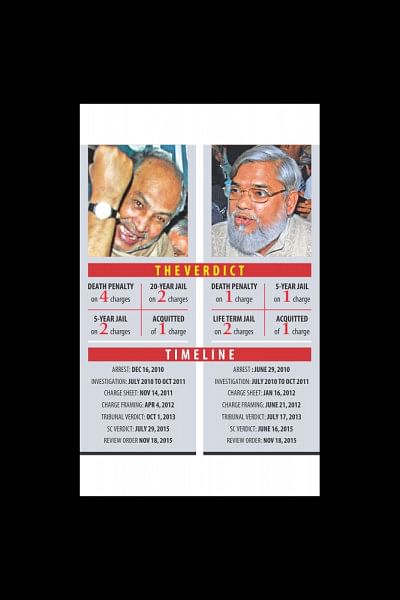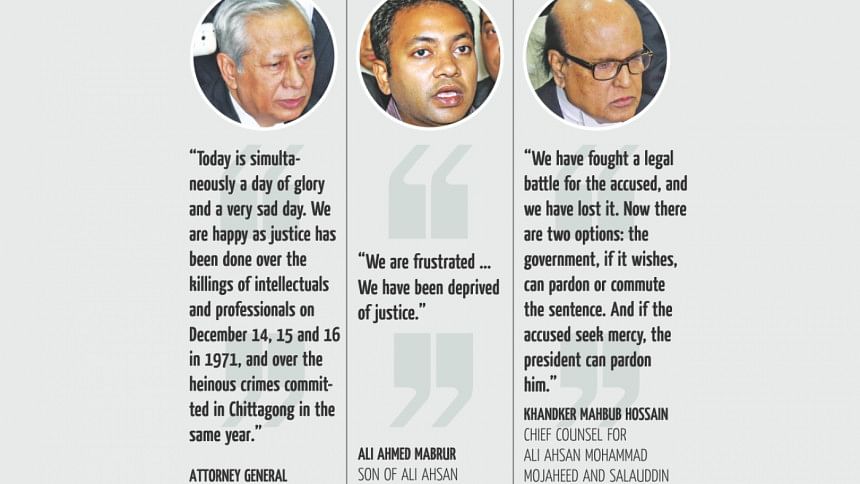Death, no less

The long legal battles in the war crimes cases against Ali Ahsan Mohammad Mojaheed and Salauddin Quader Chowdhury have finally come to an end, drawing the two condemned war criminals closer to the gallows.
The Supreme Court yesterday dismissed their petitions for reviewing its verdict that upheld their death penalty given by two special tribunals in 2013.
Now the two former ministers are left with the last option of seeking presidential clemency by confessing to the crimes they committed during the 1971 Liberation War.
The SC orders paved the way for the government to execute Mojaheed, general secretary of the Jamaat-e-Islami, and Salauddin, a member of the BNP Standing Committee.
"Now, there is no legal bar to the execution of Mojaheed and Salauddin," Attorney General Mahbubey Alam said at his office following the SC orders.
Asked whether the jail authorities would have to wait for copies of the SC orders for executing the duo, he said it would not be necessary, as there was no stay order on their execution.
However, Chief Defence Counsel Khandker Mahbub Hossain contradicted the attorney general, and said the jail authorities could execute them only after receiving a short or full order from the SC.
Meanwhile, the Jamaat posted on its twitter page that its leader Mojaheed would not seek presidential mercy as "he didn't commit any crime".
Up till now, two war crimes convicts -- Jamaat leaders Abdul Quader Mollah and Muhammad Kamaruzzaman -- have been executed since the war crimes trial began in March 2010.
And in both cases, the prison authorities carried out the execution only after getting copies of the SC orders.
Quader Mollah was hanged hours after the jail authorities received a short SC order on his review petition on December 12, 2013, while Kamaruzzaman was executed on April 11 this year after the prison authorities got the full SC order on his review petition.
In both cases, the SC orders were first sent to the tribunals that tried the war criminals. The tribunals then for warded those to the jail authorities.
Upon receiving the orders, the prison authorities informed the convicts about those. Executive magistrates then asked the convicts whether they would seek presidential clemency.
As neither Quader Mollah nor Kamaruzzaman asked for presidential mercy, the prison authorities executed them.
According to the jail code, a convict gets a week to seek presidential clemency after the jail authorities communicate the death warrant to him.

This provision is not applicable to a war crimes convict, as he is tried under the International Crimes (Tribunals) Act 1973. He, however, will get a "reasonable time" to seek presidential mercy.
Following the SC orders, Law Minister Anisul Huq said the government would now follow the guidelines that the apex court gave in Quader Mollah's case.
He said there was no need for any written order for the execution of the two convicts.
"They will be given reasonable time to seek presidential mercy. If they don't wish to seek clemency, they will be hanged," he told The Daily Star.
However, Shahidul Alam Jhinuk, registrar of the War Crimes Tribunal, said, "We are expecting copies of the Supreme Court orders. Once received, those will be sent to the jail and other authorities concerned.
"We have not yet got any copy of the orders," he told The Daily Star around 6:45pm.
Talking to journalists at the Secretariat, Home Minister Asaduzzaman Khan Kamal said they would take steps in line with the court orders and the law.
Mojaheed, who was the chief of infamous Al-Badr Bahini in 1971, was handed down death penalty in July 2013 for planning and instigating the killing of intellectuals and professionals at the fag end of the Liberation War.
He was given life sentence on two other charges, and five years' imprisonment on one.
Salauddin, a self-proclaimed brigadier in 1971, was sentenced to death in October that year for committing crimes against humanity and acts of genocide in Chittagong in 1971.
He was given death penalty on four charges -- the killing of philanthropist Natun Chandra Sinha, murders of Awami League leader Mozaffar Ahmed and his son, and two acts of genocide in Sultanpur Banikpara and Unasattarpara in Raozan of Chittagong.
The BNP leader was given 20 years in jail each on two charges and five years' imprisonment each on two other charges.
Both convicts filed review petitions on October 14 this year after the SC upheld their death penalty. The apex court heard Mojaheed's petition on Tuesday and fixed yesterday for giving orders.
Yesterday, a four-member SC bench headed by Chief Justice Surendra Kumar Sinha started hearing Salauddin's review petition around 9:00am.
Upon hearing the defence and the attorney general, the bench said it would pass orders at 11:30am.
The chief justice along with Justice Nazmun Ara Sultana, Justice Syed Mahmud Hossain and Justice Hasan Foez Siddiue sat again in the packed courtroom at 11:33am. The bench then dismissed both petitions.
Tight security measures were put in place in and around the court premises.
Talking to The Daily Star, Shaon Mahmud, daughter of martyred composer Altaf Mahmud, said it was a disgrace that the nation had to see people like Mojaheed become ministers and ride in cars flying the national flag.
"Today, we step into a new phase," she said.
In his reaction to the SC orders, Prafullah Chandra Sinha, son of Natun Chandra who was a victim of Salauddin's brutality, said, "It is a victory for the truth."
Hailing the SC orders, Prafullah said his family now expects quick execution of the verdict.
The Jamaat, meanwhile, has called a countrywide daylong hartal for today, protesting "the government's conspiracy to kill Mojaheed through a false case".
Salauddin's party BNP, however, did not come up with any formal reaction.
Disappointed with the SC order, Mojaheed's son Ali Ahmed Mabrur said, "We have been deprived of justice."
He alleged that though "no allegation of direct involvement in wartime killings" could be proved against his father, the court sentenced him to death.
Asked whether Mojaheed would seek presidential mercy, Ali told this newspaper that he would be able to comment on the matter only after consultation with the counsels and his father.
"We have already sought permission from the jail authorities to meet my father," he said.
The Daily Star could not get comments from Salauddin's family.
Both convicts are now in two adjacent condemned cells at Rajanigandha Bhaban of Dhaka Central Jail, said sources at the prison where security was beefed up following the SC orders.
Mojaheed has been there for few months while Salauddin was brought to the prison from Kashimpur jail in Gazipur four days ago, said Deputy Inspector General (Prisons) Golam Haider.
The jail authorities were yet to formally inform the two about the SC orders, as they had not received copies of the orders, he added.
Jail sources said both Salauddin and Mojaheed looked distressed yesterday.
HEARING ON SALAUDDIN'S PETITION
The apex court disbelieved the documents submitted in support of Salauddin's claim that he was not in Bangladesh when the offences he was convicted of were committed.
The court yesterday termed false the certificate issued reportedly by Punjab University of Pakistan, which says he was studying political science there in 1971. The bench said there were many anomalies in the document.
The certificate, submitted to the court in October this year, mentioned grading and semester system. But no such system existed in the university in 1971. It, in fact, offered year-wise honours course at that time, the SC said.
The court also wanted to know from which university in Bangladesh Salauddin had his credits transferred to the Pakistani university.
A student himself has to apply to a university for a certificate, but there is no information that Salauddin applied for the Punjab University certificate, it continued.
Certificates from foreign institutions are brought to Bangladesh through its high commission office, but Salauddin's certificate had no signature of Bangladesh high commission officials on it.
In the certificate, "1971" was mentioned as the year of passing. But "71" was written in a smaller font size than "19", said the court.
It was clearly understood that the certificate was fake, concluded the bench.
The court asked Salauddin's lawyers why they hadn't submitted the certificate, issued in 2012, to the tribunal in October 2013 when it sentenced the BNP leader to death or to the SC in July this year when it upheld the punishment.
It said the credibility of a certificate from Pakistan will always be in question even if it is signed by the president or the prime minister of that country, since the Liberation War was fought against Pakistan and its parliament opposed war crimes trials.
"Salauddin has created many falsehoods to hide one," the court observed.
In response, Salauddin's counsel Khandker Mahbub maintained that Salauddin's certificate was genuine.
If the court doubted its authenticity, it can have the certificate verified through Bangladesh High Commission in Pakistan or the attorney general's office, he argued.
Attorney General Mahbubey told the court that Salauddin's certificate was not authenticated by the Bangladesh mission in Pakistan or by any notary.
Salauddin was a student of Dhaka University in 1968 and it had no credit transfer system for admission to a foreign university, he said. "I know this very well as I myself was a student of Dhaka University that year."

 For all latest news, follow The Daily Star's Google News channel.
For all latest news, follow The Daily Star's Google News channel. 



Comments